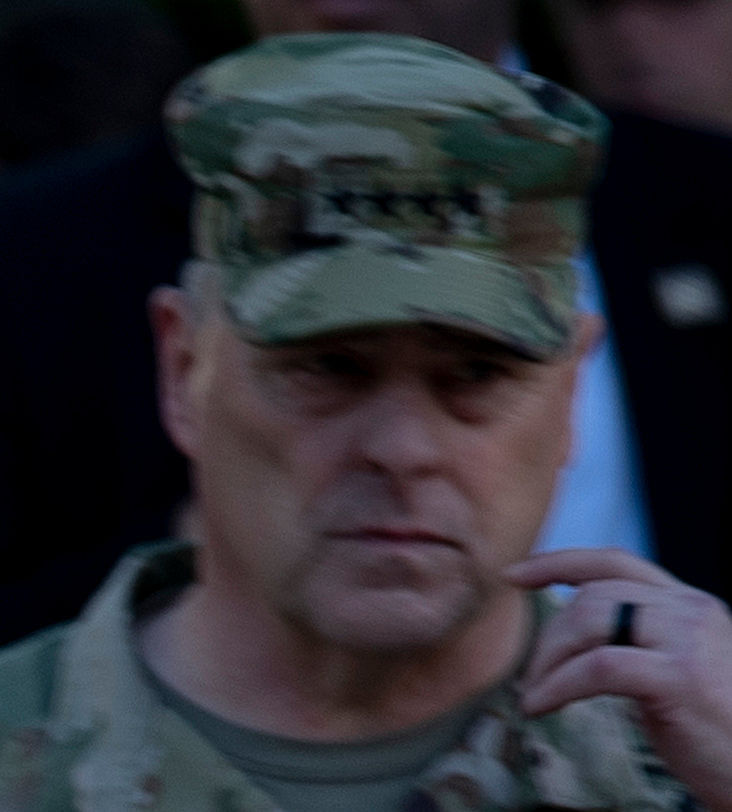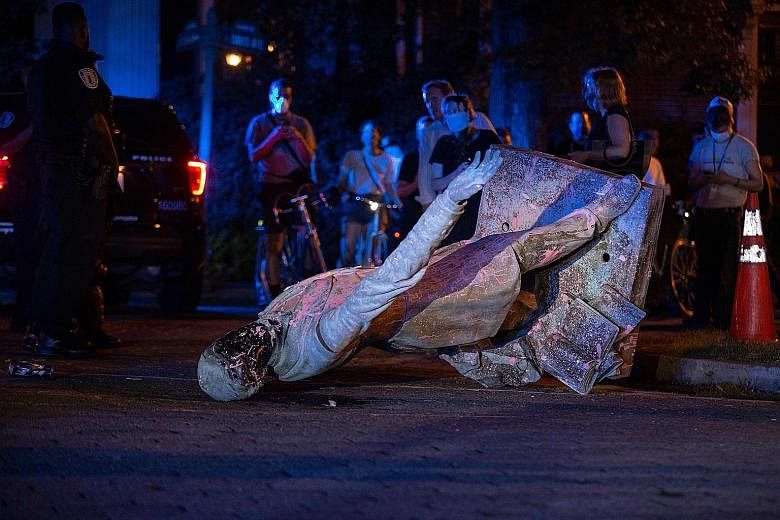WASHINGTON • The top United States military official yesterday apologised for taking part in US President Donald Trump's walk across Lafayette Square for a photo opportunity after the authorities used tear gas and rubber bullets to clear the area of peaceful protesters.
"I should not have been there," General Mark Milley, chairman of the Joint Chiefs of Staff, said in a pre-recorded video commencement address to National Defence University. "My presence in that moment and in that environment created a perception of the military involved in domestic politics."
His first public remarks since Mr Trump's photo opportunity, in which peaceful protesters were cleared with force so that the President could hold up a Bible in front of St John's Episcopal Church, are certain to anger the White House.
Mr Trump has spent the days since the police killing of Mr George Floyd taking an increasingly tougher stance against the growing movement for change.
On Wednesday, the President picked another fight with the military, slapping down the Pentagon for considering renaming army bases named after Confederate officers who fought against the Union in the American Civil War.
The back and forth between Mr Trump and the Pentagon in recent days is evidence of the deepest civil-military divide since the Vietnam War - except this time, military leaders, after halting steps in the beginning, are now positioning themselves firmly with those calling for change.
Mr Trump's walk across Lafayette Square on June 1 has sparked a critical moment of reckoning in the military. "As a commissioned uniformed officer, it was a mistake that I have learnt from," said Gen Milley.
He said he had been angry about "the senseless and brutal killing" of Mr Floyd, an African-American, and repeated his opposition to Mr Trump's suggestions that federal troops be deployed nationwide to quell protests.
Gen Milley's friends said that since that fateful day, he has agonised about appearing in combat fatigues behind Mr Trump during the walk across Lafayette Square, an act that critics said gave a stamp of military approval to the hardline tactics used to clear the protesters.
The general had believed he was accompanying Mr Trump and his entourage to review National Guard troops and other law enforcement personnel, defence officials said.
Mr Trump and Gen Milley had already exchanged sharp words on June 1 when they discussed whether to send active-duty troops into the streets.

Gen Milley argued the scattered fires and looting in some places were dwarfed by the peaceful protests and should be handled by the states, which command local law enforcement. Mr Trump acquiesced but has continued to hold out the threat of deploying active-duty troops.
Last week, Defence Secretary Mark Esper announced that he, too, opposed invoking the 1807 Insurrection Act to deploy active-duty troops nationwide to quell protests.
The protests calling for police reform and racial justice flared for a 17th day early yesterday across some cities, hours after one of the four former police officers who were charged over Mr Floyd's death in Minneapolis was released on bail.
Thomas Lane, 37, who had been held on US$750,000 (S$1.04 million) bail, was freed from jail. He was one of three officers charged with aiding and abetting second-degree murder and second-degree manslaughter. The fourth officer, 44-year-old Derek Chauvin, was filmed pressing his knee to Mr Floyd's neck as he gasped for breath. Chauvin was charged with second-degree murder and second-degree manslaughter.
Nationwide protests have seen statues of Italian explorer Christopher Columbus from Boston to Miami beheaded and vandalised as calls to remove sculptures commemorating colonisers and slavers sweep the country. Columbus is considered by many to have spurred years of genocide against indigenous groups.
But Mr Trump responded to the protests by picking a fight over the legacy of the Confederacy, slapping down the Pentagon for considering renaming army bases named after Confederate officers.
The White House said Mr Trump would go so far as to refuse to sign the annual defence authorisation Bill if Congress tried to force his hand.
"The United States of America trained and deployed our HEROES on these Hallowed Grounds, and won two World Wars," Mr Trump wrote on Twitter.
"Therefore, my Administration will not even consider the renaming of these Magnificent and Fabled Military Installations. Our history as the Greatest Nation in the World will not be tampered with. Respect our Military!"
NYTIMES, REUTERS, AGENCE FRANCE-PRESSE

